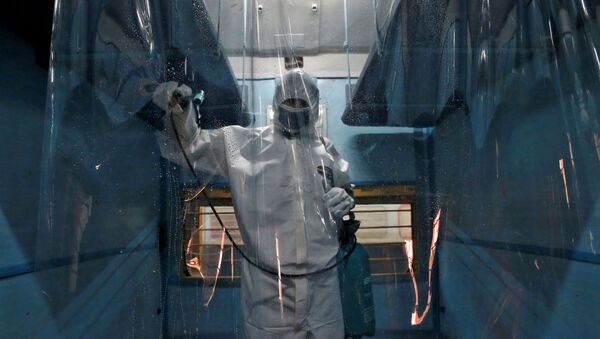With a medical crisis engulfing the entire world, the global economy has been brought to its knees by a virus. However, as the spread of the coronavirus recedes, countries will look at ways in which to revive their economies from the long-lasting impact of the pandemic.
Similarly, India will have the opportunity to become economically strong with policies that lead to self-reliance and benefit exports by using science and technology. The Indian Technology Information, Forecasting and Assessment Council (TIFAC), an autonomous technology think tank under the Indian government’s Department of Science and Technology (DST), is strategising the revival of the post-COVID-19 economy.
The autonomous think tank is not only navigating the COVID-19 virus, but also analysing desirable technology-related interventions and their impact in different sectors.
In a conversation with Sputnik, TIFAC executive director Dr Pradeep Srivastava reveals the strategies being taken by them to revive the economy in the post-COVID-19 world by leveraging the country’s science and technology skills.
Sputnik: What kind of technology-related interventions and their impacts in different sectors is the Technology Information, Forecasting and Assessment Council looking at?
Dr Pradeep Srivastava: The technology-related interventions covered in the white paper being prepared by TIFAC are: healthcare, information and communication technology (ICT) and telemedicine, manufacturing (solar, textile, equipment, machinery), agriculture and food processing and electronics. The white paper will strategise the revival of India's post-COVID-19 economy, broadly focusing on strengthening Make in India initiatives, commercialisation of indigenous technology, and adoption of emerging technologies.
Sputnik: Does a lack of investment in scientific research impede India's role in vaccine development? Could India have done better in the time of a crisis if it had better investments in science and technology?
Dr Pradeep Srivastava: The primary requirement is the use of new techniques or approaches for the development of vaccines. For example, the use of Artificial Intelligence (AI) which may play a major role in its quick development and to screen thousands of possibilities by using simulation. India can use emerging technologies to work on vaccine development. The COVID-19 outbreak is unprecedented in terms of speed of transmission. Even advanced countries have faced problems to contain this virus. So what is actually required is to think of what novel technology approaches or preparedness and stimulus is required for such situations. TIFAC's white paper will try to address this.
Sputnik: The Indian government’s expenditure on science and technology is less than many countries like Israel, South Korea, Japan, Germany, USA, and China. How is India planning to expand that for better returns?
Dr Pradeep Srivastava: Not only the Indian government but also public and private sectors should come forward and should be encouraged to make investments in research and development to increase expenditure as percentages of GDP in science and technology. This requires a host of policies to be put in place for creating appropriate ecosystems in some sectors. The government of India through various ministries has already made many such policy changes. The white paper will discuss what kind of research and development ecosystem is required for the new technology developments that are suggested in it.

